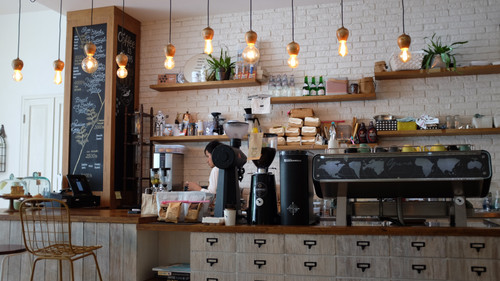How Your Travel Mug Protects the Ocean
Posted by Aless on 7th Sep 2025
Every year on September 20th, people around the world come together for International Coastal Cleanup Day, which is one of the world's largest annual preservation and protection events made possible by volunteer efforts dedicated to removing rubbish from beaches and waterways. Since its beginning, more than 18 million volunteers have collected more than 380 million pounds of trash, serving as an important reminder of the impact our daily choices have on the health of our oceans.
However, protecting marine ecosystems doesn’t have to be limited to a single day each year, it can become part of your everyday routine. Even small actions, such as choosing a reusable travel mug for your morning coffee, can make a meaningful contribution by reducing waste and keeping our seas cleaner.
Understanding the Plastic Crisis in Our Oceans
Plastic pollution in our oceans has reached alarming levels, with an estimated 5.25 trillion pieces of plastic debris currently floating in marine environments according to National Geographic. Each year, approximately 8 million tonnes of plastic waste enter the oceans, equating to a staggering 33 billion pounds annually. This influx is largely due to mismanaged waste, with nearly 22% of global plastic waste being inadequately disposed of, often ending up in natural environments.
The consequences of plastic pollution poses a severe threat to marine ecosystems worldwide driving declines in biodiversity and environment resilience. According to WWF, plastic pollution kills 100,000 marine mammals every year with 81 out of 123 marine mammal species being known to have eaten or been entangled in plastic, especially seat turtles. The loss of these animals has wide-ranging consequences, as many play key roles in maintaining marine ecosystem balance including regulating prey, supporting seagrass beds, and cycling nutrients. As a result, this makes ecosystems more vulnerable to threats like climate change and overfishing with lower malleability.
Microplastics have penetrated even the deepest parts of the ocean, reaching concentrations of up to four billion particles per square kilometers, and pose serious threats to marine ecosystems and human health. These tiny particles are easily ingested by marine organisms, from plankton to fish, accumulating in the food chain and potentially affecting species at every level, including humans. In addition, they can also absorb and transport toxic chemicals, further amplifying their harmful effects.
If current trends continue unchecked, projections indicate that by 2040, as much as 29 million tonnes of plastic could enter the oceans annually, intensifying the environmental crisis and its devastating impacts on marine life, biodiversity, and coastal communities.
The Impact of Disposable Coffee Cups
So, where does your daily flat white fit into this picture? That seemingly innocent paper cup is a major part of the problem. Most disposable cups are lined with a thin layer of plastic to make them waterproof, however, this design feature also makes them incredibly difficult to recycle through standard paper recycling systems. Consequently, the vast majority of the 500 billion disposable cups that are consumer annually end up in landfills or, in many cases, entering rivers and oceans.
The Role of Travel Mugs in Reducing Waste

A reusable travel mug is more than a convenient vessel for your coffee, becoming a simple yet powerful tool for reducing waste. By choosing a reusable cup, you step away from a system that generates volumes of single-use waste. In Australia alone, switching to reusables has the potential to divert thousands of kilograms of waste from landfill each year, while reducing the energy and resources needed to produce disposable cups.
Over time, this small daily choice accumulates into a collective impact, helping to preserve natural resources, cut greenhouse gas emissions, and protect marine ecosystems from plastic pollution.
What Makes Huskee Unique?
What sets Huskee apart is our holistic approach to design, sustainability, and material innovation. At the heart of our products is the HuskeeCup, crafted from an eco-composite polymer that incorporates coffee husk which is the discarded outer layer of the coffee bean, as a key ingredient. Millions of tonnes of this by-product are generated globally each year, often regarded as waste, but Huskee transforms it into a durable, resilient material that gives new life to agricultural waste.
The cup’s design reflects the same thoughtful approach, seen through its ergonomic fins that protect your hands from heat while providing a secure grip, and the double-wall insulation keeps beverages at the ideal temperature. This blend of utility, beauty, and simplicity is the result of our expertise in sustainable manufacturing, creating a product that not only performs brilliantly but also actively supports a circular economy.
Every stage of our manufacturing process is geared towards efficiency, sustainability, and quality, ensuring a long-lasting product that meets rigorous safety standards. By repurposing coffee husks and committing to transparent, responsible production, Huskee delivers more than just a coffee cup, but provides a practical, stylish, and environmentally conscious solution for everyday life.
Combatting Single-Use Waste with HuskeeLoop and HuskeeSwap

Our commitment to a circular system extends past the design of our products. We carefully consider the entire lifecycle of every HuskeeCup, including what happens when it reaches the end of its long life. That’s where HuskeeLoop comes in, which is our end-of-life program that ensures that any damaged or old HuskeeCups can be returned to us, broken down, and repurposed into new products. By keeping materials in use and out of landfill, we prevent waste from reaching the ocean, directly supporting efforts to reduce the plastic pollution that International Coastal Cleanup Day highlights each year.
Even the most sustainable cup is only effective if it’s convenient to use, which is why we created HuskeeSwap, a global cup exchange program. Customers can drop off a used HuskeeCup at a participating café and receive a freshly cleaned one in return, eliminating the need to carry a dirty cup. For cafés, it streamlines operations, reduces single-use cup costs, and demonstrates genuine commitment to sustainability.
For users, it provides a seamless, convenient way to choose reuse over disposables. With thousands of cafés participating worldwide, this community-based approach shows how small, collective actions, like choosing a reusable cup and returning it through a circular system, can make a significant impact in reducing waste, protecting marine ecosystems, and contributing to healthier oceans.
Your Choice Shapes a Cleaner Future
It can be easy to think one person cannot make a difference, but every time you reach for a reusable mug instead of a single-use cup, you are helping protect the environment. These small choices reduce plastic waste and show businesses that sustainability matters.
From local cafés to coastlines around the world, we have seen how single-use cups fuel the plastic crisis in our oceans. By choosing a Huskee Cup, you are not just enjoying your coffee in a thoughtfully designed, sustainable mug, you are preventing waste from ever reaching our waterways.


